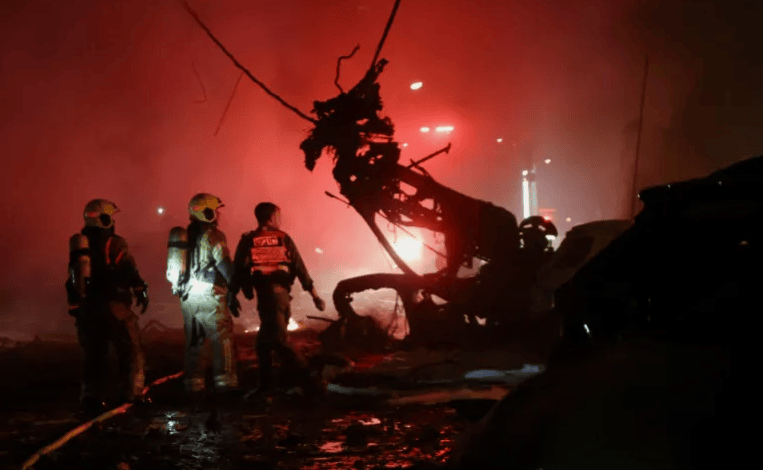
A fire has been sparked by Iran’s missile strike in Haifa [Shir Torem/Reuters]
In June 2025, missiles fall, people die, and two powerful nations—Iran and Israel—are now at open war. The world watches, but does nothing.
Many Muslim-majority countries, especially in the Middle East, speak about peace and justice. But when it comes to action, they remain silent or weak. These countries have real power to influence the situation—but they are not using it.
They Have Power—But Don’t Use It
Middle Eastern Muslim countries have energy, money, religious leadership, and public support. They are part of the Organization of Islamic Cooperation (OIC), a group of 57 Muslim countries. They also have seats in the United Nations, control oil and gas, and lead some of the world’s richest economies.
So why can’t they stop the violence? Why don’t they pressure the U.S. and Israel to end war, occupation, and nuclear threats?
Let’s look at what they could do—and why they don’t.
Use Oil and Energy as a Tool
Many Gulf countries—like Saudi Arabia, UAE, Kuwait, and Qatar—sell oil to the U.S., Europe, and Asia. This gives them power.
They could:
Raise oil prices or limit exports until Israel stops attacks.
Use OPEC+ to pressure the West.
But they don’t. Why? Because:
They are afraid it will hurt their own economy.
They don’t want to anger the U.S.
They have big investments in Western companies.
Control Their Investments
Muslim countries have billions of dollars invested in U.S. tech, banks, and weapons companies. They could:
Pull out their money from companies that support war or settlements.
Block business with firms that sell arms to Israel.
But again—they don’t. Most of these countries depend on U.S. protection, and their elites benefit from business deals.
Speak with Religious Power
Saudi Arabia is home to Mecca and Medina, the holiest sites in Islam. Egypt hosts Al-Azhar, a top Islamic university. Iran leads many Shia Muslims.
They could unite and say:
"No more bloodshed in the name of religion."
"Let’s make the Middle East free of all nuclear weapons."
But these voices are divided. Some support the U.S., others support Iran. And many are afraid of protests in their own streets.
Break or Pause Ties with Israel
Some countries—like Egypt, Jordan, UAE, Bahrain, and Morocco—have peace deals or trade with Israel.
If they wanted to send a message, they could:
Suspend these agreements.
Recall ambassadors.
Stop military or tech cooperation.
But most stay quiet. They prefer trade and U.S. support over justice for Palestine or peace with Iran.
Use Their Votes at the United Nations
Muslim countries make up a large group in the UN. They could:
Demand an investigation into war crimes.
Call for international laws to apply to all nuclear states.
But the U.S. often vetoes these moves in the Security Council. And the General Assembly has no real power—only words.
Raise Global Awareness Through Media
Networks like Al Jazeera, Al Arabiya, and others reach millions. Muslim countries could support powerful media campaigns to:
Show what is really happening in Gaza, Iran, and beyond.
Call out Western double standards.
But these efforts are often blocked, censored, or used only for local politics—not for real change.
Support Global Boycotts
They could join or support the BDS (Boycott, Divestment, Sanctions) movement, or create their own peaceful pressure campaigns.
But many governments are afraid. They worry about being punished, called extremists, or losing Western aid and weapons.
Why the Silence?
Fear of the U.S.
Rivalry with Iran (Sunni vs. Shia)
Love of wealth and Western business
Weak leadership and no unity
The people in these countries often care deeply about Gaza, about justice, and about peace. But the governments do not act.
Final Word: From Customers to Leaders
As long as Muslim countries act like customers—buying weapons, oil deals, and promises from the West—they will have no power.
But if they choose to act like leaders, stand together, and say “enough,” they can help change the story.
The war machine survives because too many stay silent. It’s time to speak, act, and stand for justice—not just for one side, but for all people in the Middle East.
[Next: The World (silent & unfair) Is Watching, But Who Will Act?]

Editor & Publisher
Dulal Ahmed Chowdhury
www.newsdiplomats.com
The News Diplomats
Cell: +1 (437) 365-4003 & +1 (647) 709-3389
Email: [email protected]
Toronto, Canada.
©২০২৩ সর্বস্বত্ব সংরক্ষিত || The News Diplomats